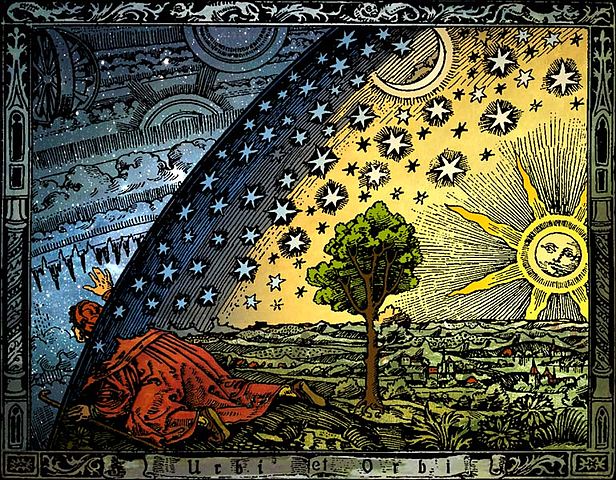
File:Universum.jpg

| |
This is a file from the Wikimedia Commons. Information from its description page there is shown below.
Commons is a freely licensed media file repository. You can help. |
Contents |
Summary
| Description | Universum - C. Flammarion, Holzschnitt, Paris 1888, Kolorit : Heikenwaelder Hugo, Wien 1998 |
| Date | 1998 |
| Source | Heikenwaelder Hugo, Austria, Email : heikenwaelder@aon.at, www.heikenwaelder.at |
| Author | Heikenwaelder Hugo, Austria, Email : heikenwaelder@aon.at, www.heikenwaelder.at |
Licensing
|
Additional information
- "Eine Montage von Camille Flammarion für sein Werk 'L'Astronomie populäire', das 1880 erschien"; siehe: Jean Pierre Verdet. Der HIMMEL. Ordnung und Chaos der Welt. Ravensburg: Maier, 1991, S.26
This is a modification of the Flammarion Woodcut is an enigmatic woodcut by an unknown artist. It is referred to as the Flammarion Woodcut because its first documented appearance is in page 163 of Camille Flammarion's L'atmosphère: météorologie populaire (Paris, 1888), a work on meteorology for a general audience. The woodcut depicts a man peering through the Earth's atmosphere as if it were a curtain to look at the inner workings of the universe.
The original caption below the picture (not included here) translated to: "A medieval missionary tells that he has found the point where heaven and Earth meet...".
Further information from: "Flat Earth"
"During the 19th century, the Romantic conception of a European " Dark Age" gave much more prominence to the Flat Earth model than it ever possessed historically. The widely circulated woodcut of a man poking his head through the firmament of a flat Earth to view the mechanics of the spheres, executed in the style of the 16th century cannot be traced to an earlier source than Camille Flammarion's L'Atmosphere: Météorologie Populaire (Paris, 1888, p. 163) . The woodcut illustrates the statement in the text that a medieval missionary claimed that "he reached the horizon where the earth and the heavens met", an anecdote that may be traced back to Voltaire, but not to any known medieval source. In its original form, the woodcut included a decorative border that places it in the 19th century; in later publications, some claiming that the woodcut did, in fact, date to the 16th century, the border was removed. Flammarion, according to anecdotal evidence, had commissioned the woodcut himself. In any case, no source of the image earlier than Flammarion's book is known. (quote from en:Flat Earth)
Discussion
- Note. The Text "Urbi et orbi" does not appear in the original Flammarian woodcut. SteveMcCluskey 23:13, 25 February 2007 (UTC)
- The text "Urbi et Orbi" appears on this image because it is the cover design for the punk album Urbi Et Orbi (EP). As such, it is inappropriate as an illustration for anything except articles about that album. 76.204.93.188 14:39, 23 January 2011 (UTC)
This image with Urbi et Orbi, is pure manipulation and unlogic in this context. There is no religion on the image, therefore the afterwards added description is just fictioning - stealing the idea of nature for their instrumentlizing moral.cua NGÔ HOÀNG THĂNG And in the same time the take the focus of the astonishing fact, that there is an universum out there and it does not need any religious explanation. Therfor the pope decided to give this his Urbi et Orbi / again he manipulates the fact that there is no church in the image, but now it is. For the user it should be more obvious AND both version should be alowed. But the original is the one which a wikipedia should support, as peopel come to wikipedia, because of the logic and not for manipulated views and stolen ideas! -- Tales23 ( talk) 11:40, 12 January 2009 (UTC)
-
- Please note the two wheels on the left: obviously they are not stars; it seems to be a hint to the wheels of the throne of God, described by en:Ezekiel. Even though this very nice picture is subtly derogatory and POV, as it attributes to a church missionary, opinions derived from fairy tales about reaching the base of a rainbow (see picture) and false information on medieval science, still it was prepared by an artist with stronger biblic information than shown in the above comment. Pinea
This coloring is not particularly good, compared to the many others that exist. The tree, for example, is miscolored -- the lower branch appears transparent. The lake in the lower right is filled in green instead of blue, the entire "landscape" is flat green, with no attention to detail. If a page is going to be redundant enough to contain both a black-and-white and a colored version of the same file, it seems worthwhile to at least have a "good" colored version. Many are available. - 71.218.10.216 23:21, 3 April 2009 (UTC)
- Who is it that persists on using this colorization instead of the black & white original? Quite aside from the fact that it's not faithful to the drawing and that it contains an extraneous Latin text, it's simply not the original illustration, but rather a manipulation of it (a rather ugly one, in my opinion) by an anonymous person. It's not even one of the colorizations that has appeared in print outside of Wikipedia. - 67.233.203.125 00:24, 23 January 2011 (UTC)
File usage
Metadata
| Orientation | Normal |
|---|---|
| Horizontal resolution | 72 dpi |
| Vertical resolution | 72 dpi |
| Software used | Adobe Photoshop CS Windows |
| File change date and time | 23:47, 6 November 2005 |
| Colour space | Uncalibrated |
The best way to learn
Schools Wikipedia was created by children's charity SOS Children. SOS Children's Villages believes that a decent childhood is essential to a happy, healthy. Our community work brings families new opportunities through education, healthcare and all manner of support. If you'd like to help, why not learn how to sponsor a child?
